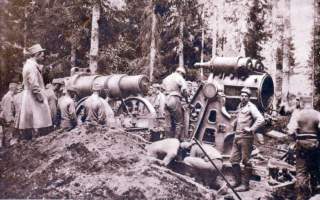World War I's Empire of the "Living Dead": Austria-Hungary
Joseph Roth’s magnum opus, The Radetzky March, portrays the decline and death of an empire that has outlived its time by telling the story of the ill-omened Trotta family, whose sad end—like in a Greek tragedy—is preordained.
The Radetzky March is an important novel, since it singularly conveys the constrained spirit that some leaders of the Great Powers in Europe must have experienced prior to the First World War—the feeling that the conflict was preordained and that diplomacy merely provided respite from the inevitable clash that would bring down the old world, despite their best efforts. The Russian Czar and the German Kaiser were in that sense less perceptive than the Trottas, since the monarchs did believe in victory and by doing so, accelerated their own downfalls. Still—and this is the real tragedy of the novel—while the Trottas did not believe in the success of Austrian arms, they went along with the war just the same, and are, therefore, exemplary of the ‘living dead’ in all the European countries and capitals at that time, who faithfully helped set in motion the all-consuming juggernaut in the summer of 1914. Perhaps, this is also the reason why the question of war guilt still puzzles historians and political scientists: If all are guilty, no one is guilty.
Of course, it is not possible to deny that Joseph Roth, especially when portraying the Emperor Franz-Josef, is somewhat glorifying the past of an autocratic empire. Roth, in the late 1930s, actively but unsuccessfully advocated for the reestablishment of the monarchy in Austria. Yet, he also shows the horrors of Austria’s campaign in the East, especially the heinous crimes committed by the Austrian military against Ukrainians suspected of harboring pro-Slavic sympathies in the first weeks of the war:
The Austrian army’s war had begun with court-martials. For days on end genuine and supposed traitors hung from the trees on church squares to terrify the living. Hasty court-martials in villages passed hasty sentences. Secret informers delivered unverifiable reports on peasants, Orthodox priests, teachers, photographers, officials.
Rather than an expression of effete Habsburg nostalgia, Roth, in The Radetzky March, seems to grasp the essence of the Japanese mono no aware—being aware of the transience of all things heightens the appreciation of their beauty. It is this latent beauty prior to the outbreak of the Great War that makes the novel resonate in our modern times. In that sense, Roth’s plaintive narrative of the brief existence of the Trotta family also cautions us to appreciate one’s own time, for it is just as fleeting. And while the monarchy rightfully concluded its hour upon the stage, it is inevitable that future empires and civilizations will share the Dual Monarchy’s Ozymandian passing. This alone should stir our interest in the summer of 1914 and the ill fortune of the Trottas.
Franz-Stefan Gady is a senior fellow at the EastWest Institute, where he was a program associate and founding member of the Worldwide Cybersecurity Initiative. Follow him on Twitter (@HoansSolo).

